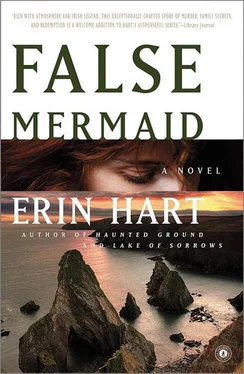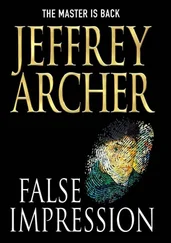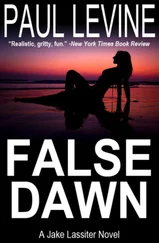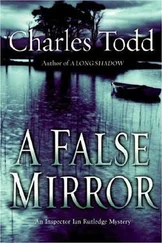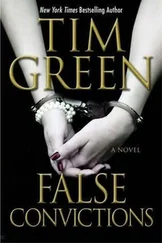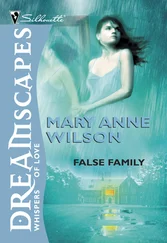Cormac half rose from his seat. “Let me give you a hand, Roz—”
“Don’t stir yourself. I’m just going to peg these into the sink—you and Joe can take care of them later.” She backed through the kitchen door, arms full of crockery.
“Don’t worry, you’ll get your chance,” Joseph said. “That’s the one thing I’ve learned in living so long—the washing up never ends.” He looked thoughtfully after Roz as she retreated into the scullery. “Well now, Cormac, I can’t imagine what brings you all the way up here. Delighted to see you, of course—”
Cormac leaned forward slightly and lowered his voice: “Actually, I’m here because Mrs. Foyle phoned and told me you’d had a stroke.”
“Bloody woman!” The old man looked like he was on the verge of apoplexy, but he spread both hands on the table in front of him, trying to stay calm. “I was going to tell you in my own time. A few days ago, I had what you might call a spell—not serious, a bit of dizziness—Roz drove me to Casualty over at Killybegs. A mini-stroke, they said—transient ischemic attack, if you want to get technical. They put me on blood thinners, advised plenty of rest. I’ve done everything they told me, and I’ve been right as rain since then, I swear. Don’t know how Geraldine Foyle managed to get hold of that intelligence. Foostering auld magpie—it’s she who’ll give me a stroke with all her meddling. The curse of fuckin’ Jaysus on her!”
Cormac felt slightly alarmed. “I’m sorry if I’ve been the cause of any of this. When you first came here, she offered to look in, see if you needed anything, and I’m afraid I didn’t dissuade her—”
“Ah, no, no, I didn’t mind, when I was first here it was grand, you know. She’d pop over—neighborly enough. That was fine. But here’s what happened lately—come here till I tell you.” He gestured for Cormac to lean in, and spoke under his breath. “Didn’t she happen to see Roz coming out of the house one morning about two weeks ago, and decided on the spot she’d call in? To see how was I getting on, she said. But what was she doing, only sniffing around the place, jumping to all sorts of preposterous conclusions! ‘At your age,’ says she, ‘you ought to be ashamed.’ I told her there was no need for me to feel shame, since she obviously fetched up enough for the whole parish. You should have heard her, the sanctimonious, Holy Mary carry-on. Wages of sin, all that auld shite. When you think of the suffering it’s caused in the world—” He stopped himself, but only momentarily. “Not to mention the sheer bloody hypocrisy of it—Roz may have neglected to mention it, but that flahoola of a landlady above in Portnoo happened to be Geraldine Foyle’s first cousin. At any rate, a few more words were exchanged.” He waved a hand. “I may have passed some intemperate remarks about the late Mr. Foyle’s untimely exit.” Cormac could see the old man was still feeling less than apologetic; on the contrary, he seemed rather pleased with himself. “She hasn’t put her beak in since.”
“Why drag me all the way up here over nothing?”
“Well, Geraldine Bloody Foyle wasn’t getting satisfaction from me, obviously. She had to create some pretext so that you’d come rushing up here to break up the love nest. Ah, don’t ask me how her mind works—the woman is sick.”
Cormac considered for a moment. “I hope you’ll forgive an indelicate question, but is there anything for me to break up?”
Joseph’s eyes flickered over to the kitchen door, beyond which they could hear Roz humming absently. His demeanor softened. “Are you serious? Roz Byrne may be a kindhearted woman, but she’s not completely daft.”
In the end, they’d agreed Cormac should stay on another few days, to spare him the long drive back to Dublin after he’d just arrived, and to be doubly certain that his father was suffering no ill effects from the “spell.”
As he looked out over the silent waves below Slieve League, Cormac realized that the time had come to make a decision: head back to Dublin in the morning, or catch a plane to the States. He had felt Nora deliberately keeping her distance when they’d last spoken on the phone, but was it because they were finished, or because she didn’t want to burden him with troubles that were not his own? Either answer, he realized, was unsatisfactory. He looked at his watch. Just after nine Irish time; she must have arrived at her parents’ place in Saint Paul by now. At least he’d assumed that’s where she would be staying; she’d offered no confirmation.
The setting sun slid down below a bank of gray clouds, a solid orange mass defying him not to stare. Out here on the headlands, each day mirrored the cycle of life. That was the way the ancients had seen it. Every new day was a resurrection, every nightfall a little death. How many more times must the mighty chariot driver perish in the sea before he stopped his dithering and actually did something?
He had simply appeared on Nora’s doorstep once before, fourteen months ago, and everything had worked out then. Beyond all expectations, really. He could make it to Saint Paul in a day or two, if he could only convince himself that she would welcome him. It was obvious that she wasn’t going to ask for help, but she couldn’t refuse it either—could she? He’d been going back and forth like this for days, trying to read into her words what perhaps wasn’t there. He didn’t even know how he could help her, only that he felt an overwhelming desire to try. Climbing to his feet from the damp, rocky ground, Cormac looked out over the choppy waves and considered everything he’d given up to be here, all because of Geraldine Foyle’s priggish puritanical streak. The curse of fuckin’ Jaysus on her, indeed.
Standing at the edge of the precipice, looking down hundreds of feet to the dark sea below, he knew he’d already flung himself from that place of safety, metaphorically speaking. He would go to America, just as soon as he could book a flight.
Cormac wondered whether he ought to tell Nora of his plan. Words—and e-mail most especially—seemed altogether too puny for his purpose. At that moment, the first notes of a sinuous melody began to snake through his brain, beginning long and low, then rocking back and forth, then surging forward with a wild abandon. That was it—he would send her a tune. The idea was beautifully simple—just attach an audio file to an e-mail message. How was it this notion had never occurred to him before?
The sudden stroke of inspiration absorbed his thoughts the whole way back to the house at Ardcrinn. He wasn’t even aware of the jarring ride along the narrow, crumbling road that went up the mouth of the glen from Teelin. In his head he was already holding the wooden flute, feeling its familiar heft, and thinking how strange it was that a man might pour the breath of his body into a hollow tube, and through a kind of wizardry that breath could be captured—bottled, in a way—and transmitted over vast miles, to any spot on the face of the planet. He tried to imagine where Nora was at this very moment, and how she might react to such a cryptic message. If she listened closely—even if she was unfamiliar with the tune, even if its title was obscure to her—surely she would hear and understand everything he was trying to say.
Nora pushed aside a teetering stack of manila file folders and checked her watch. A quarter to ten. She had only meant to unpack, but had been pulled again into the mystery of Tríona’s death. She’d been going through files for four solid hours. Dusk had come and gone, and the room was illuminated only by the bedside lamp and a shaft of light from the kitchen. She switched on the overhead fixture and studied the wall, now covered with maps and photographs, newspaper clippings, and dozens of index cards, each one enumerating a scrap of physical evidence, a witness, a lead. She had envisioned this wall like an incident room—thinking perhaps that seeing everything laid out would trigger some connection, some logical leap she might have overlooked. It looked more like one of those crazy collages put together by a deranged stalker.
Читать дальше
